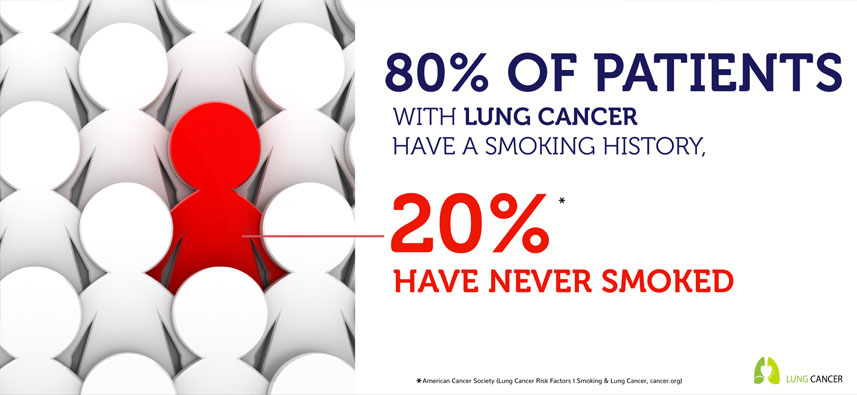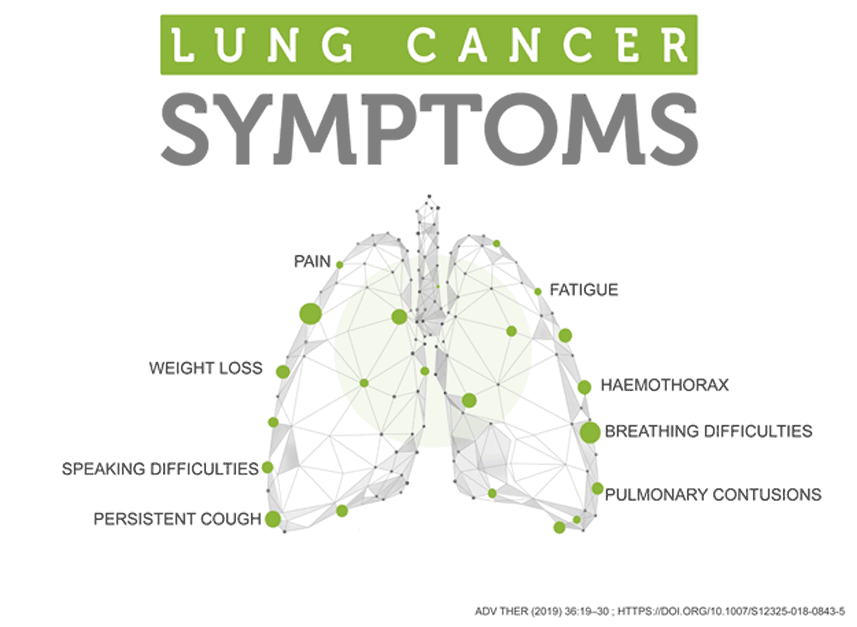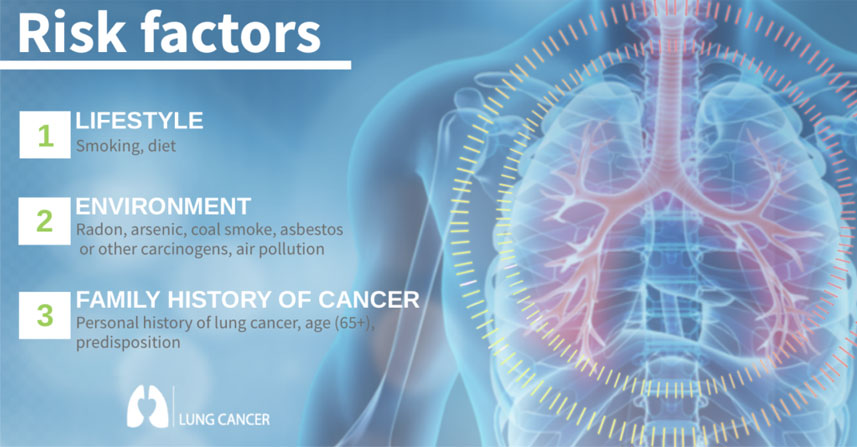Lung Cancer Awareness Month 2021
Lung cancer is a disease you can’t see,
but you can feel it coming
New campaign aims to raise awareness for symptoms and early warning signals
Ahead of Lung Cancer Awareness Month this November, Belgian patient representatives, healthcare professionals & academic centres, national & regional organizations and pharma industry partners will launch an initiative in which they call for more attention for lung cancer. Key focus areas are raising awareness of symptoms, increasing knowledge around the diversity of lung cancer types and improving understanding of risk factors. Lung cancer represents 13% of the total number of cancer cases in Belgium [1].

Smokers and non-smokers
Lung cancer remains the third most frequent cancer in Belgium [1] and 1 out of 5 people diagnosed with lung cancer never smoked [2]. This initiative centers around a social media campaign to drive awareness and encourages the public to consult their general practitioner and to get themselves checked, particularly when faced with persistent and unexplained symptoms. Early diagnosis and treatment can improve life expectancy and quality of life.

Risk factors & unsuspected symptoms
Although more than 80 % of all lung cancer cases are linked to smoking [2], many people that have never smoked or have been exposed to passive smoke develop lung cancer. It is estimated that 1 out of 5 people newly diagnosed with lung cancer never smoked. Many factors can lead to lung cancer: lifestyle (smoking, diet), environmental factors (radon, arsenic, coal smoke, asbestos or other carcinogens, air pollution), family or personal history of lung cancer, age (65+), predispositions (COPD, pulmonary fibrosis, head, neck & oesophageal cancer or prior thoracic radiotherapy treatment for lymphoma or breast cancer) [3, 4].

In recent years, there has been an increase of late-stage diagnosis because people ignore common symptoms such as persistent cough, breathing difficulties, pain, fatigue and weight loss among others[5]. Prof Johan F. Vansteenkiste, Head of Clinic at the Respiratory Oncology Unit of UZ Leuven explains: “Anyone with lungs can get lung cancer. It is essential that anyone with persistent symptoms consults their general practitioner as soon as possible. By ignoring unexplained symptoms and not getting checked in time, people increase the risk of potential late-stage diagnosis.” He adds: “Early detection can dramatically improve the choice of treatment options and therefore both quality of life and life expectancy.”

3 types of lung cancer make up 75% of cases
Lung cancer arises from cells in the lung that have grown abnormally and multiplied to form a tumor. Depending on the way these abnormal cells look, two forms of lung cancer are differentiated. Small-cell lung cancer (SCLC) represents around 20 to 25% of cases in Belgium and non-small-cell lung cancer (NSCLC) representing 75 to 80% of cases [6]. There are three major types of NSCLC: adenocarcinoma, squamous cell lung cancer (also called epidermoid carcinoma) and large cell lung cancer. Less common types of lung cancer include pleomorphic, carcinoid tumor, salivary gland carcinoma, and unclassified carcinoma.
Getting the right diagnosis as early as possible
Medical history, imaging tests, laboratory tests, biopsies and biomarker tests will enable a specialist to diagnose lung cancer and determine whether it has spread to other parts of the body. Some of these tests will help determine the stage of the lung cancer at diagnosis and help the healthcare professional determine which treatment options might work best for the patient. The classification system (ranging from stage I to stage IV) is based on tumor size, how much it has spread into lymph nodes/glands, and whether there is another tumor in the body that can be related to the main tumor in the lung (metastasis). This staging process is sometimes referred to as TNM (tumor, node and metastasis).
New & diverse treatment options
Advances in the science of lung cancer – and ongoing clinical trials – have led to a wider array of treatment options being available to lung specialists. The last 10 years have brought new options such as targeted therapies or immuno-oncology, or combination therapies, in addition to the classical chemotherapy, radiotherapy and surgery. Additionally, it is important to stress that in Belgium supportive, palliative, care is available for stage IV lung cancer patients. This is not to be mistaken for terminal care.
Need for more support for patients living with lung cancer
Additionally, the initiative launched this November aims not only at highlighting the need for more support for patients and their families, but also the need for a stronger lung cancer patient representation in Belgium. A stronger patient voice will help ensure that lung cancer care fits the patient needs when healthcare solutions and services are developed for these patients. Finally, this initiative wants to leverage different existing patient groups that provide information & support to people living with lung cancer in Belgium. Paula Koper from ALK Positive Belgium testifies that “It was a huge relief for me to connect with other patients that have the ALK+ genetic translocation which occurs only in approximately 5% of all lung cancers [7]”. She adds “We founded this group, as we quickly realized that we didn’t fit the typical lung cancer patient profile and could benefit from the exchanges with peers, facing the same issues such as stigmatization but also severe fatigue”. Other patient organisations, such as Vaincre (Brussels), focus on lung cancer in general.

Information resources and support
For more information about lung cancer, its causes, symptoms, examinations and treatments, please visit the dedicated pages of Fondation contre le Cancer / Stichting tegen Kanker or Kom op tegen Kanker. Patients and caregivers looking for support can reach out to: VAINCRE, ALK Positive Belgium, LuCE (Lung Cancer Europe).
About Lung Cancer Awareness Month
Lung Cancer Awareness Month takes place annually in November in many countries around the world. It encourages people to reduce the risk of lung cancer by increasing awareness of symptoms and risk factors, understanding of lung cancer and the importance of screening and early detection. It is also a time to highlight the ongoing research and scientific advances made to provide more treatment options and ultimately better outcomes for patients living with lung cancer.
About the initiative
The ambition of the partners that started this lung cancer initiative is to set thematic priorities, supported by each of the stakeholders, in the fight against lung cancer. By leveraging the collaboration between patient organizations, patient representatives, healthcare professionals, policy and industry, the lung cancer initiative aims to address those areas where patient needs are the highest. The participants who participated in the co-creation workshop of this initiative include patient groups (Vaincre, ALK Positive Belgium, LuCE), healthcare professionals & academic centres (UZ Leuven, UZ Gent, UCL – Saint-Luc, AZ Delta, AZ Vesalius), national & regional organization (Fondation contre le Cancer/Stichting tegen Kanker, Kom op tegen Kanker, BeRS, AFBOT, LLCG) and pharma industry (AstraZeneca, Janssen, MSD & Roche).
- https://kankerregister.org/statistieken_tabellen_jaarbasis (C34) (last accessed on 10/2021)
- https://www.cancer.org/cancer/lung-cancer/causes-risks-prevention/risk-factors.html (last accessed on 10/2021)
- https://www.cancer.be/les-cancers/types-de-cancers/cancer-du-poumon/causes (last accessed on 10/2021)
- https://erj.ersjournals.com/content/48/3/889
- https://www.ncbi.nlm.nih.gov/pmc/articles/PMC6318240/pdf/12325_2018_Article_843.pdf
- https://www.cancer.be/les-cancers/types-de-cancers/cancer-du-poumon (last accessed on 10/2021)
- https://www.alkpositive.org/what-is-alk (last accessed on 10/2021)
AFBOT = Association Francophone Belge d’Oncologie Thoracique; ALK = Anaplastic Lymphoma Kinase; BeRS = Belgian Respiratory Society; COPD = Chronic Obstructive Pulmonary Disease; LLCG = Leuven Lung Cancer Group; LuCE = Lung Cancer Europe; NSCLC =Non-Small Cell Lung Cancer ; REO = Respiratoire Oncologie; SCLC = Small Cell Lung Cancer; TNM = Tumor, Node, Metastasis
Andere categorieën